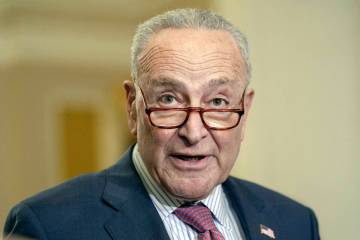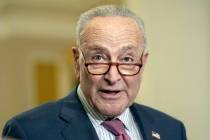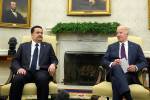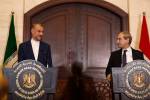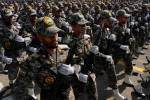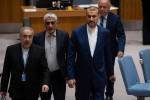Attack on Iranian general intended ‘to stop a war,’ Trump says
WASHINGTON — President Donald Trump said Friday he ordered a drone airstrike in Iraq that killed a top Iranian general “to stop a war,” not to start one.
Trump’s brief remarks followed the death of Maj. Gen. Qassem Soleimani, the head of Iran’s elite Quds Force, who was killed Thursday as he left the Baghdad airport. Trump praised the attack as “a flawless precision strike that killed the No. 1 terrorist anywhere in the world.”
“Soleimani made the death of innocent people his sick passion, contributing to terrorist plots as far away as New Delhi and London,” Trump said from his Mar-a-Lago resort.
The State Department estimates that Soleimani, the mastermind of Tehran’s concerted campaign over two decades to establish Iranian hegemony in the Middle East through the use of proxy militias, was responsible for the death of more than 600 U.S. troops during the Iraq war.
For that reason, Trump argued, “What the United States did yesterday should have been done long ago.”
A deserving target
Many Democrats in Congress and Democratic presidential candidates said Friday that Soleimani was a deserving target, but they questioned whether Trump had thought through the repercussions of the attack.
Former Vice President Joe Biden said Soleimani “deserved to be brought to justice for his crimes against American troops and thousands of innocents throughout the region.” But he added he was concerned about escalating tensions and charged that “Trump just tossed a stick of dynamite into a tinderbox.”
In a statement, House Speaker Nancy Pelosi, D-Calif., said she feared the attack would escalate tensions with Iran “to the point of no return.” She also said the drone strike was done without an Authorization for Use of Military Force against Iran, and “was taken without the consultation of the Congress.”
Later on the Senate floor, Senate Minority Leader Chuck Schumer, D-N.Y., asserted “no one should shed a tear” over Soleimani’s death, before he criticized the administration’s failure to consult Congress ahead of the attack.
“It is my view that the president does not have the authority for a war with Iran,” Schumer said. “If he plans a large increase in troops and potential hostility over a longer time, the administration will require congressional approval and the approval of the American people.”
Jonathan Schanzer of the Foundation for the Defense of Democracies said the administration had been careful to stipulate that the attack should be seen “not as an act of retribution, but as an act of self-defense.”
Escalating tensions
Thursday’s attack follows a steady escalation of hostilities between Tehran and Washington that followed Trump’s decision in 2018 to withdraw from the international nuclear pact brokered with Iran.
After Iran destroyed a $100 million U.S. drone in the Persian Gulf in June, Trump considered responding with a military strike, but then called it off because it seemed disproportionate to him.
Then on Dec. 27, rocket attacks into a U.S. military air base in Iraq that the U.S. blames on the Iran-backed Shiite militia Kateab Hezbollah killed a U.S. contractor. That, Schanzer noted, crossed Trump’s “red line.” In short order, U.S. airstrikes left 25 Kateab Hezbollah fighters dead.
On New Year’s Eve, Iran-backed militias invaded the U.S. Embassy in Baghdad. Two days later, Soleimani flew into Baghdad.
“Soleimani thought that he could travel to Iraq to discuss with forces funded by Iran his plans to target Americans, and that the United States would not target him. That was obviously a fatal miscalculation,” Tom Warrick, nonresident senior fellow at the Atlantic Council in Washington, wrote on the council’s website.
The drone attack was swiftly condemned by Iranian officials. Iranian Foreign Minister Mohammad Javad Zarif called the killing of Soleimani “an act of international terrorism” and “a foolish escalation.”
Iran’s Supreme Leader Ayatollah Ali Khamenei warned that a “tough revenge” awaited “the criminals who have his blood and the blood of the other martyrs” on their hands, according to a statement translated by Iran’s FARS News agency.
In addition to Soleimani, at least six other were killed in the attack, an Iraqi official confirmed to CBS News.
Schanzer said he will watch to see if Iran responds with an overt strike, or cleaves to its usual path of striking out against the United States through proxies. “How will the U.S. respond if they climb the escalation ladder?” he asked.
During a briefing with reporters, National Security Adviser Robert C. O’Brien said that the best path for Iran would be “to behave like a normal nation as part of the community of nations.” If Tehran chooses the right path, he said, the Iranian people could have a “fabulous future.”
“The strike was a tactical military success, but we won’t know if it was a strategic success for quite some time,” Warrick told the Review-Journal. “What comes next is as important as the strike itself. If a year from now, the U.S. has had to pull its military and diplomatic personnel out of Iraq,” he warned, then Soleimani will have won “a posthumous victory.”
Contact Debra J. Saunders at dsaunders@reviewjournal.com or 202-662-7391. Follow @DebraJSaunders on Twitter.
"The Trump Administration must fully brief Congress on the airstrikes and its plan to protect those in harm's way from Iranian retaliation. Qasem Soleimani was responsible for killing hundreds of Americans and we must do whatever possible to ensure that his death does not lead to further bloodshed. The American people have no appetite for war with Iran and neither do I."
-Rep. Dina Titus, D-Nev.




